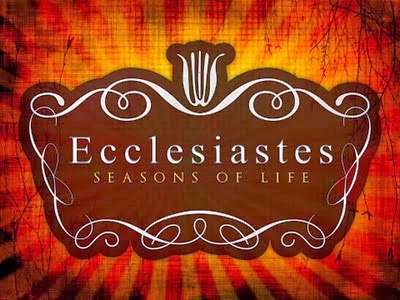The great debate
This book has been called the sphinx of the Bible, a not unapt name, for the book is grave, majestic, mysterious. Whatever its meaning be, it contradicts itself in the most flagrant way, looked at from every standpoint bug one. The book is clearly the record of a debate either between two men—one of them smitten with unbelief and despair, the other filled with conviction and hope; or more probably between two men in some one man—two parts of the same soul. In this great debate three things are discussed.
But perhaps, we say, your experience was exceptionally unhappy, No, he answers, I have looked over the whole of life and find it everywhere the same. There is, for instance, he goes on, a season, a marked fixed time for everything and to every purpose under the heavens, and he enumerates some twenty-eight of these seasons, and the activities for which they are propitious. Looked at from one point of view it is very beautiful, no doubt, but under such a fatalism, in a world where everything is arranged beforehand, what room is there for man to will or act? Fate! Fate! everywhere fate and vanity.
2) Whether they get them or no, yet still they are disappointed in their hopes. The truth is, the world is much better in show than substance; and those very things we admire before we enjoy them, yet afterward we find much less in them than we expected.
"Three views of human life are given in this remarkable chapter.
I. The theatrical view of life (Ecc_2:1-11). The writer seeks to prove his heart with mirth and laughter; he treats his flesh with wine; he gathers peculiar treasure; he is enamored of greatness, magnificence, and abundance; he delights in architecture, scenery, literature, music, song. Everything is spectacular, dazzling, wonderful. This is a very misleading idea of the world in which we find ourselves.
1. It is partial. Nothing whatever is said here of the problems which challenge us—of duty, enterprise, discipline, work, sacrifice, suffering; nothing about character or conduct. It really leaves out two-thirds of life, and the noblest two-thirds.
2. It is exaggerated. It contemplates great works, great possessions, and great fame. Life is largely made up of commonplace tasks, homely faces, uneventful days, monotonous experiences.
3. It is selfish. You see throughout how prominent the individual is. It is all “I.” The writer never thinks of other people except as they may enhance his pleasure, or be spectators of his glory.
4. It is superficial. There is not a word about conscience, righteousness, responsibility. Now beware of the theatrical view of life—of the great, the gaudy, the glistering. True life, as a rule, is simple, sober, and severe. Beware of companions who would represent life to you in a gay and voluptuous light. Beware also of your reading, and see that it does not give a false and delusive idea of the life that awaits you. The world is not a theatre, not a magician’s cave, not a carnival; it is a temple where all things are serious and sacred." -Biblical Illustrator


No comments:
Post a Comment